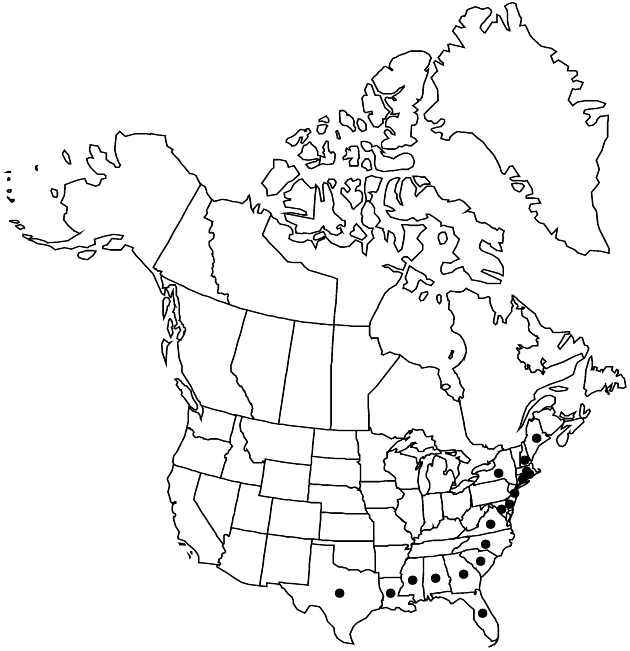Symphyotrichum tenuifolium
Phytologia 77: 293. 1995.
Perennials, (20–)40–60(–100) cm, colonial or cespitose; rhizoma-tous. Stems 1–5+, ascending to erect (often with purple or purplish brown areas, flexuous, wiry), little-branched, usually glabrous, sometimes hairy in lines distally. Leaves thick (fleshy), margins entire, faces glabrous; basal withering by flowering (new winter rosettes appearing at flowering), petiolate (petioles sheathing), blades ovate or oblanceolate, 15–20 × 5–15 mm, bases cuneate, apices rounded; proximal cauline withering by flowering, usually sessile, blades lanceolate, linear-lanceolate or -oblanceolate, to linear, 7–80(–150) × 1–6 (–12) mm, bases attenuate, margins entire, apices acuminate to acute; distal sessile, blades narrowly lanceolate to subulate, 10–110 × 0.5–5 mm, apices acuminate. Heads (1–)3–20(–40), in open, diffuse, paniculiform arrays, branches patent. Peduncles 0.6–4 (–6) cm, bracts 2–8, awl-shaped, grading into phyllaries. Involucres narrowly turbinate, 4.1–9.5(–11) mm. Phyllaries in 4–5 series, lanceolate to subulate, bases indurate, rounded, margins hyaline, often tinged with purple, entire, green zones spatulate to oblanceolate-rhombic, apices acute, adaxial faces glabrous or minutely hairy distally. Ray florets 10–25; corollas white or pink, laminae (4.5–)5–8.5(–9.5) × 1.2–2 mm. Disc florets 25–45(–54); corollas yellow becoming purplish, 3.4–6(–6.8) mm, tubes shorter than to equaling the narrowly funnelform throats (sparsely hairy at base), lobes ± erect, narrowly triangular, 0.5–0.8 mm. Cypselae light brown, narrowly obovoid to fusiform, sometimes ± compressed, 1.5–4(–4.5) mm, 5–6-nerved, faces sparsely strigillose; pappi tawny to white, 3–6.1 mm.
Distribution

Ala., Conn., Del., Fla., Ga., La., Maine, Mass., Md., Miss., N.C., N.H., N.J., N.Y., R.I., S.C., Tex., Va., West Indies.
Discussion
Varieties 2 (2 in the flora).
Along the Gulf of Mexico Coast in central and northern peninsular Florida, vars. tenuifolium and aphyllum intergrade in nearly all characters (S. D. Sundberg 2004). G. L. Nesom (2005d) treated the varieties as species.
Selected References
None.
Key
| 1 | Stems 1, rhizomes long; mid leaves (1.5–)3–6 mm wide; involucres 6–9.5(–11) mm; ray florets (12–)17–25; disc florets 25–45(–54), corollas (4–)4.7–6(–6.5) mm; cypselae 2.8–4(–4.5) mm; pappi 5–6.1 mm | Symphyotrichum tenuifolium var. tenuifolium |
| 1 | Stems 1–5+ (clustered), rhizomes short; mid leaves (1–)1.5–2.7 mm wide; involucres 4.1–5.3 mm; ray florets 10–16; disc florets (10–)13–23, corollas 3.4–4.6 mm; cypselae 1.5–2(–2.5) mm; pappi 3–4.4 mm | Symphyotrichum tenuifolium var. aphyllum |